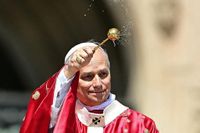On Pentecost Sunday, June 8, 2025, Pope Leo XIV delivered a stirring homily in St. Peter's Square that captured the profound significance of the Holy Spirit’s descent upon the Apostles and its enduring impact on the Church and the world. Marking the fiftieth day after Easter, Pentecost commemorates the moment when the Holy Spirit transformed a frightened group of followers into courageous heralds of God’s message. The Pope described the Holy Spirit as "the Gift that opens our lives to love," emphasizing its power to break down barriers within our hearts and between peoples.
In his homily, the Pope reflected on the Apostles’ state before Pentecost. "Following Jesus’s death, they had retreated behind closed doors, in fear and sadness," he said. But then, "they receive a new way of seeing things, an interior understanding that helps them to interpret the events that occurred and to experience intimately the presence of the Risen Lord." The Holy Spirit, he explained, "overcomes their fear, shatters their inner chains, heals their wounds, anoints them with strength and grants them the courage to go out to all and to proclaim God’s mighty works." This transformation, he noted, is not limited to the Apostles but is available to all who open their hearts to the Spirit.
Pope Leo XIV also expressed concern about the isolating effects of modern society, particularly the paradox of social media. "Sadly, oddly enough, in a world of burgeoning ‘social’ media, we risk being ever more alone," he observed. "Constantly connected, yet incapable of ‘networking’. Always immersed in a crowd, yet confused and solitary travellers." The Holy Spirit, he said, challenges this individualism and selfishness, breaking down our "hardness of heart, our narrowness of mind, our selfishness, the fears that enchain us and the narcissism that makes us think only of ourselves." It is through abiding in love that we receive the strength to remain faithful and allow God’s word to transform us.
One of the most poignant parts of the homily was the Pope’s reflection on how the Spirit opens borders not only within individuals but also in relationships and communities. He quoted the late Pope Benedict XVI, who said, "The Spirit opens borders... The Spirit overcomes the ‘breach’ that began in Babel, the confusion of mind and heart that sets us one against the other." The Pope explained that the Spirit enables us to "open our hearts to our brothers and sisters, overcoming our rigidity, moving beyond our fear of those who are different, and mastering the passions that stir within." He acknowledged the darker side of human relationships, lamenting "those cases where relationships are marked by an unhealthy desire for domination, an attitude that often leads to violence, as is shown, tragically, by numerous recent cases of femicide." This, he said, is a painful reminder of the work still needed to cultivate healthy, loving relationships.
On the eve of Pentecost, June 7, Pope Leo XIV celebrated the vigil Mass for the Solemnity, addressing an estimated 70,000 pilgrims gathered in St. Peter's Square for the Jubilee of Ecclesial Movements, Associations, and New Communities. He spoke about "Synodality," describing it as the Church’s call to live as one. "It demands that we each recognize our own poverty and our riches, that we feel part of a greater whole, apart from which everything withers, even the most original and unique of charisms," he said. The Pope urged communities to be "training grounds of fraternity and sharing, not merely meeting places, but centres of spirituality." He emphasized that the Spirit "inspires the contemplative dimension of life that rejects self-assertion, complaining, rivalry and the temptation to control consciences and resources." Where the Spirit is present, there is freedom, joy, and hope.
Evangelization, according to Pope Leo XIV, is "not our attempt to conquer the world, but the infinite grace that radiates from lives transformed by the Kingdom of God." He called on all members of the Church to work harmoniously as one body, cooperating with bishops and parish communities to face humanity’s challenges with less fear and darkness. "The future will be less dark and discernment will be less complicated… if together we obey the Holy Spirit!" he declared.
The rich symbolism of Pentecost was also highlighted in reflections from other Church leaders and sources. Bishop Edward Malesic likened the event to a reversal of the Tower of Babel story, where God confused human speech to prevent prideful ambition. At Pentecost, the Holy Spirit enabled the Apostles to speak in many tongues yet be understood by all, symbolizing unity through the "language of our faith." This gift births a Church that is universal, one, holy, and apostolic, guiding believers on their pilgrimage toward eternal life.
Historical and liturgical traditions surrounding Pentecost further deepen its meaning. The feast includes a Vigil with readings from Genesis, Exodus, Ezekiel, or Joel, and the ancient Sequence "Veni, Sancte Spiritus" is recited or sung, one of only three such sequences used throughout the liturgical year. The descent of the Holy Spirit was accompanied by miraculous signs: a mighty wind filling the room, tongues of fire resting on each Apostle, and the miraculous ability to speak different languages. Peter’s first Pentecostal sermon converted some 3,000 people, marking the birth of the Church and the fulfillment of God’s promise to unite humanity.
As Dunford Cole, presiding elder and pastor, noted, Pentecost is a "significant moment marking the beginning of the church," when the Holy Spirit empowered the Apostles to share Jesus’ teachings with love, peace, and unity. He encouraged the faithful to celebrate the day by embracing the Spirit’s transformative power and wearing red to symbolize the flames of the Spirit.
Pope Leo XIV’s homily and the accompanying reflections remind us that Pentecost is not just a historical event but a living reality. The Spirit continues to "shatter our inner chains," break down borders in our hearts and communities, and renew the Church and the world. The Pope’s prayerful conclusion implored the Blessed Mother to intercede that the "strong wind of the Spirit" might "come upon us and within us, open the borders of our hearts, grant us the grace of encounter with God, enlarge the horizons of our love and sustain our efforts to build a world in which peace reigns." As we mark Pentecost in 2025, this message resonates deeply: the Holy Spirit is the source of love, courage, and unity, calling us beyond fear and division toward a shared, hopeful future.


